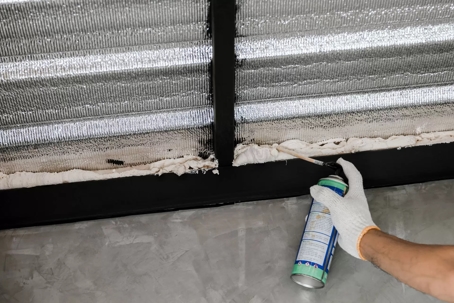The Top 7 Benefits of Spray Foam Insulation for Metal Buildings
Enjoy the many advantages of spray foam insulation for metal buildings. Most people already know spray foam insulates wooden structures better than any alternative. Does spray foam work well in a metal building? Will it resolve any condensation problems?
First Things First - Can You Spray Foam a Metal Building?
The short answer is - yes, you can have your metal building insulated with spray foam.
Metal buildings are titans of strength and durability, but comfort? It's not always their specialty. Spray foam insulation offers a solution; it can transform your metal building into a temperature-controlled, energy-efficient haven.
Let’s explore the top seven benefits of insulating a steel building with spray foam.
1. Superior Insulation
Closed-cell spray foam reduces heat transfer better than any other type of insulation on the market.
The extra heat resistance of spray foam insulation is a revelation for metal buildings, which conduct heat better than other building materials. Plus, spray foam fits into all the nooks and crannies that fiberglass batts can not reach.
2. Air Sealing
Traditional insulation always leaves air leaks, which can create drafts that reduce the energy efficiency of a steel building.
The most common gaps, cracks, and penetrations that cause air leaks include those found near:
- Doors
- Windows
- Chimneys
- Recessed lights
- Plumbing vents
- Attic hatches
Air sealing also improves indoor air quality by keeping pollution and allergens out of the house. It also reduces obnoxious street noise.
3. Moisture Barrier
Spray foam insulation creates an effective vapor barrier for a metal building, preventing moisture intrusion and condensation problems. Closed-cell spray foam also creates a waterproof seal, even in the toughest spots to reach.
Building owners love to install spray foam in their pole barns to keep their livestock comfortable and in their metal sheds to protect their tools and equipment from the elements.
4. Structural Strength
One of the best benefits of spray foam insulation for a metal building is reinforced structural strength.
Closed-cell spray foam demonstrates considerable compressive strength, improving the structural integrity of metal buildings by providing extra support to metal panels.
If a panel suffers damage, the property owner can replace it and reapply spray foam. Spray foam costs less per square foot than the metal panel itself.
5. Reduced Carbon Footprint
Open and closed-cell spray foam allow property owners to shrink their carbon footprints through decreased energy consumption.
More than any other type of insulation, spray foam maintains a comfortable temperature inside a metal building, leading to less frequent use of the furnace, air conditioner, and fan. After years of decreased electricity and gas consumption, the result is a net gain for the environment.
6. Mold Prevention
When moisture sets in, mold and mildew growth can affect the health of a metal building’s occupants.
When it comes to mold prevention, closed-cell spray foam performs better than open-cell spray foam. However, both options provide ample protection against humid weather and condensation because they are made of an inert polymer that does not permit mold growth.
7. Lowered Utility Bills
Save money on utility bills by installing open and closed-cell spray foam.
Not only does spray foam keep conditioned air inside a metal building, but it also improves the efficiency of an HVAC system by maintaining air temperature in the ducts and vents.
Within a matter of a few years, spray foam insulation can pay for itself through decreased climate control usage and lowered utility bills.
How Professionals Use Spray Foam Insulation for Metal Buildings
Building owners should not try to spray insulation themselves. They should hire a trained professional instead. Spray foam insulation in steel buildings offers several benefits, but only if an expert technician installs it correctly. Some of the steps an experienced installer will follow include:
- Reviewing information provided by the metal roof panel manufacturer
- Consulting with electricians and HVAC technicians
- Creating a perfect building envelope by layering metal panels with spray foam insulation
- Selecting closed-cell spray foam to insulate a metal building
- Working from the outside in to avoid structural damage at the joints
- Treating the spray foam to increase its longevity
Open Cell vs. Closed Cell Spray Foam in a Metal Building: Which is Right for You?
When insulating your metal building, two types of spray foam dominate: open-cell and closed-cell. Generally, closed-cell spray foam is the preferred choice for your metal building.
Why is closed-cell spray foam more ideal? Continue reading to find out:
- Open-cell foam offers a lower cost and excellent soundproofing capabilities. However, its open cellular structure allows for some moisture vapor transmission. This can be a concern in metal buildings, where condensation can form on the cooler metal surface.
- Closed-cell foam, on the other hand, boasts a higher R-value per inch, translating to superior thermal resistance. Additionally, its closed-cell structure acts as a vapor barrier, significantly reducing moisture transmission.
Thus, closed-cell spray foam is ideal for metal buildings. It minimizes the risk of condensation and provides exceptional insulation.
The Metal Building Spray Insulation Experts | iFOAM
Do you own a drafty metal building? Why not make it more comfortable and save on energy costs with spray foam insulation for metal buildings? Our expert spray foam installers have worked with every type of metal building and delivered flawless results. Call iFOAM at (855) 935-4723 to book a free consultation.





